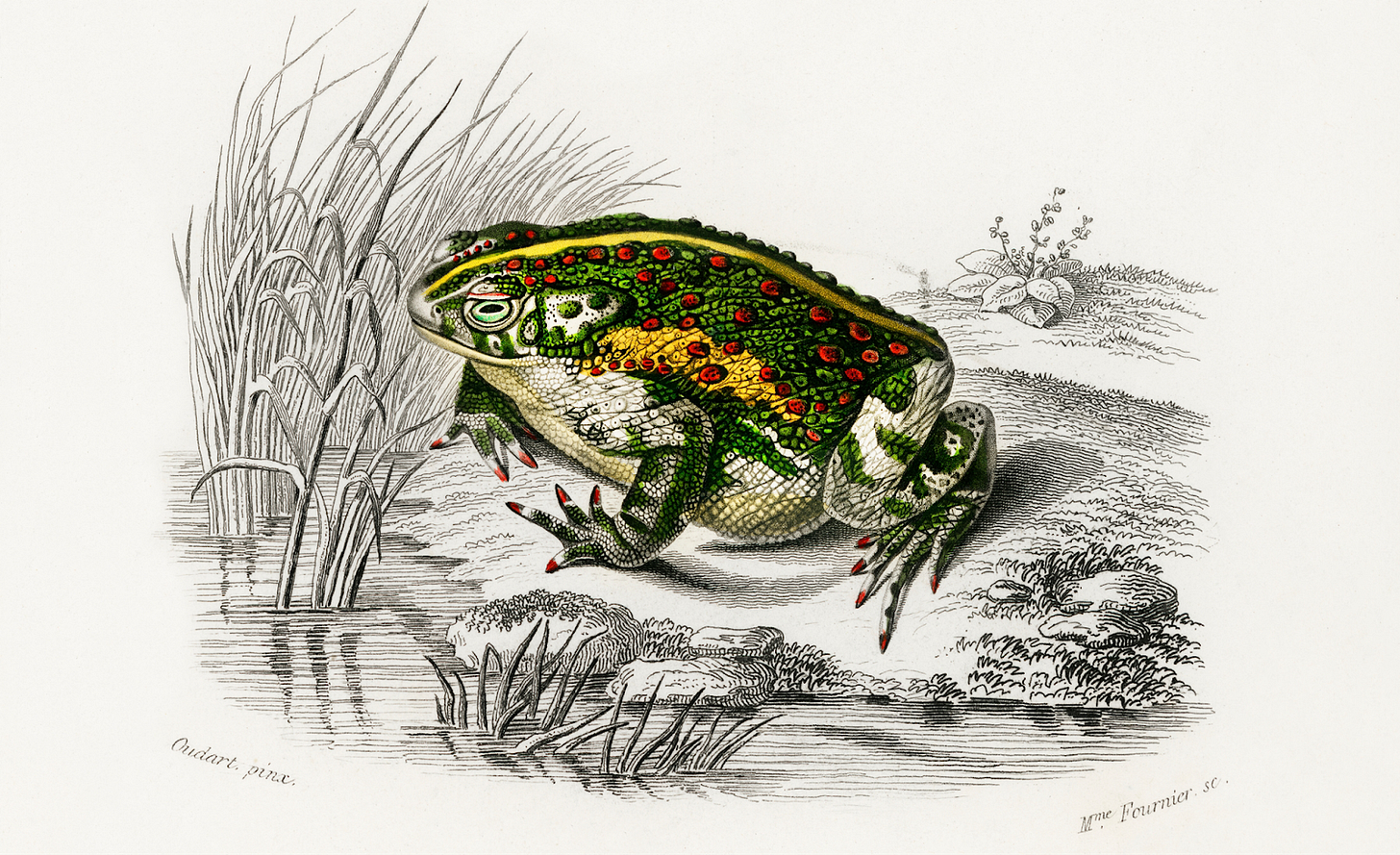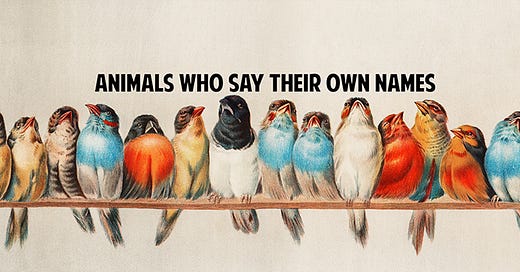The Surprising Animals Who Say Their Own Names
Or why the Kittiwake and the Zyzzyx won’t stop talking about themselves.
Everyone knows that a Cuckoo says “cuckoo.” It’s the least interesting thing about the cuckoo, which lays its egg in the nests of other birds to outsource the hard work of parenting, and in fact was almost certainly a clever ploy by this wicked animal to avoid being called the Deadbeat bird. In the Year of Our Lord 2024, I for one am committed to spending vastly less time on the villainous cuckoo, which says “cuckoo” and destroys families, and paying much more attention to the lovely Pobblebonk frog, which says “bonk” and lives in a pond in Australia.

A deeply unpleasant habit in humans and cuckoos (who should both be focusing more on soul-searching and apologizing), saying your own name all the time can be surprisingly endearing if you are the right sort of animal. The Chickadee, for instance, says “chickadee,” which is marvelously charming, although if you catch one in a down moment, she’ll tell you that she prefers to say “fee-dee”—“chickadee” is reserved for situations when a predator is approaching, with more “dees” added to signify increased deadliness. Our referring to chickadees as “chickadees” is like an intelligent alien species’ choosing to call us the “Stop-thief!” which would be rude, to say the least.
Less problematically, the American Bittern says “dunkadoo,” which is why they were called dunkadoos until around the 1950s, when we all lost our collective sense of whimsy, apparently. More problematically, the Great Tit may well be saying “tit” (the OED connects the word to Scandinavian formations like “tita,” and “titre” which are etymologically imitative, and mean “to chirp”), as does the Sultan Tit and the gloriously named Black-Throated Bushtit, though the Tom-tit says “chickadee,” which is confusing of it.
But it’s not just birds, pobblebonk frogs, and Jason Derulo who are in the habit of hopping around and saying their own names. The Katydid, famously, says “Katy did,” though the earliest sources for the name will admit that they may actually be saying “Katy didn’t,” which leaves us, and Katy, precisely nowhere. And the Wishtonwish, which is an old nickname for the prairie dog, has been known to say “wishtonwish” when the mood strikes, though you’re more likely to find her saying something quite rude and highly specific about you personally—prairie dogs, like chickadees, have an extremely complex language for describing approaching predators with an impressive amount of detail.

In a truly baffling turn of events, the most famous occurrence of “wishtonwish” in English is in James Fenimore Cooper’s The Last of the Mohicans, where it is used to describe not a prairie dog, but the North American Goatsucker, or Whippoorwill, who, as everybody knows, would never say “wishtonwish”—even to a passing prairie dog—because they’re far too busy saying “Whippoorwill.” Who “Poor Will” is, no one seems to know, though one might speculate that he’s the first guy who called one of these birds a North American Goatsucker. The whippoorwill has a cousin called the Chuck-will’s-widow who’s very fond of saying “Chuck Will’s widow” (this supports my Goatsucker theory), though it all gets a bit more complicated at the family reunion when the various members of the Enemies of Will Society run into their distant relative the Whip-tom-kelly, who—and it gives me no pleasure to report this—says “Whip Tom Kelly.”
Enough whippoorwill drama.
The Chickaree, also known as the Douglas Squirrel, says “chickaree” (and never “Douglas”), while his good friend the Chipmunk says “Chip,” which means that if you happen to be the Turtles bassist and Monkees producer Chip Douglas, you’re going to be one for two at a squirrel convention. The lady Dik-dik says “dik dik,” but only in an emergency. When a male dik-dik is feeling threatened, however, he says something like “speeeeeego” (as far as I can make out), which doesn’t do much for anyone. If you’re disappointed after threatening a male dik-dik and want a slightly better experience, you could do worse than seeking out a Grunt fish, who grunts when he’s angry, or a Whistlepig, who whistles when alarmed, but I’d strongly recommend finding almost any other hobby. “Whistlepig” is just another name for the groundhog or the hoary marmot, all of whom had a pretty bad day whenever they were first handing out names for animals.

I’ll end just by quickly noting that the Pipit says “pipit,” the Kittiwake says “kittiwake,” the Chough says “chough,” and the Zyzzyx absolutely insists on saying “zyzzyx.” The Black-Tailed Godwit says “Godwit,” which is very pious of it, but the Bar-Tailed Godwit, or Yarwhelp, says “Yarwhelp,” like a frightened pirate. The Bobolink says “Bob o’ Lincoln,” no matter who you are. And the Go-Away Bird really does say “Go away,” which is what I shall be saying to any freeloading cuckoos I happen to see this year.





Thoroughly enjoyable, as always.
You are such an excellent writer and this article was a great example of clever, witty, funny and educational talent! As an avid bird photographer, it was a joy to read and share ..thank you!